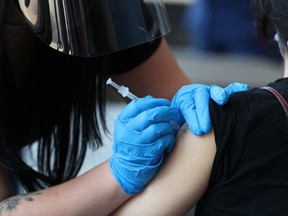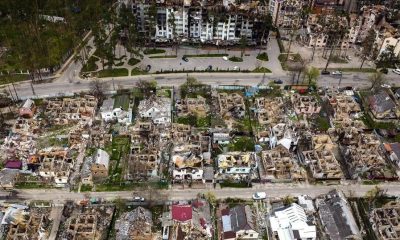Article content
Ontario reported 656 new COVID-19 cases on Wednesday, and 13 new deaths.

Ontario reported 656 new COVID-19 cases on Wednesday, and 13 new deaths.
Six of the newly reported deaths occurred more than two months ago.
There are 339 COVID patients currently in Ontario hospitals, including 163 patients in ICU with COVID-related illnesses, and 96 on ventilators with COVID-related illnesses.
Toronto, with 158 new cases, York, with 76, and Hamilton, with 73, were the province’s worst-hit regions.
In other health units in the capital region, the Eastern Ontario Health Unit saw its confirmed case numbers go up by four while Leeds, Grenville and Lanark reported no new cases, as did Kingston. Renfrew County, meanwhile, saw its overall case count drop by one.
The new figures raise Ontario’s total number of COVID cases since January 2020 to 566,206 and its death toll to 9,516. There are 15,377 active cases in the province.
Additionally, 34,703 vaccine doses were administered in the province in the 24-hour period ending Tuesday evening, for a province-wide total of 20,757,954. A total of 9,964,336 Ontarians have been fully vaccinated, an increase of 21,502 over the previous day’s total.
Overall, 83 per cent of eligible Ontarians have had at least one shot, while 76 per cent have received two.
Ontario residents will have to show proof of full vaccination to access indoor dining, bars, casinos, bingo halls, sports facilities, sporting events and more beginning on Sept. 22.
The province announced a long-anticipated plan Wednesday that would make full vaccination mandatory for many non-essential businesses and services.
The province says it will have a digital vaccine certificate that can be scanned by businesses ready by Oct. 22.
Ottawa Public Health reported 20 new COVID-19 cases on Wednesday and no new deaths, bringing the total number of COVID cases in the city to 28,373 since the pandemic started, while the death toll remains unchanged at 593.
There are currently 225 active cases in Ottawa, a decrease of two from the previous day. Of those, 10 people are in hospital with COVID, one in intensive care.
The city’s seven-day rolling average of cases, meanwhile, is 19.6 per 100,000 population.
Ottawa’s seven-day positivity rate in testing is 1.9 per cent, while the seven-day reproduction rate, R(t), is 0.99, indicating that the virus’s spread is slightly decreasing.
As of 3 a.m. Wednesday, 86 per cent of Ottawans 12 and over had received at least one vaccine dose, while 79 per cent were fully vaccinated.
There is one new active outbreak reported in Ottawa, with two cases identified at Little School day care.
Of the new cases in Ottawa in the past 30 days that have been identified by their variant or mutation, 87 per cent were from the Delta variant.
In Quebec, 690 new COVID cases were confirmed Wednesday, and two new deaths.
It was the province’s highest number of daily new cases since mid-May.
The new figures bring the province’s overall case count to 389,914 since the pandemic began, and its death toll to 11,288.
There are 138 COVID patients hospitalized in Quebec, including 40 in intensive care.
Additionally, the province administered 24,734 vaccine doses in the most recent 24-hour reporting period, for a province-wide total of 12,366,735.
As of Wednesday, Quebecers must show proof of vaccination to take part in a variety of activities and to enter a variety of places.
The province says the measure will reduce the spread of COVID-19 and help avoid the need to shut down parts of the economy.
Vaccine Hunters Canada, the volunteer-run organization set up to help Canadians find vaccination information, has wound down its operations.
The group, founded in March and with more than 425,000 followers on social media platforms Twitter, Discord, Facebook, Instagram and TikTok, tweeted its last on Tuesday, saying that with most Canadians now fully vaccinated and vaccines more widely available now than when they set up shop nearly six months ago, their services had become less crucial.
Since its formation, the group’s online self-serve Find Your Immunization tool was accessed by more than two million unique users.
Despite the group’s departure from social media, its website, vaccinehunters.ca, and its self-serve tools and resources, will remain active. Additionally, while its social media channels will be inactive, they will not be deleted.
“Although we hope there won’t be a need for these channels in the future,” a statement on the website notes, “we won’t be shutting them down altogether, just in case.”
-With files from Postmedia

|
Give the gift of great skin this holiday season Skinstitut Holiday Gift Kits take the stress out of gifting Toronto, October 31, 2024 – Beauty gifts are at the top of holiday wish lists this year, and Laser Clinics Canada, a leader in advanced beauty treatments and skincare, is taking the pressure out of seasonal shopping. Today, Laser Clincs Canada announces the arrival of its 2024 Holiday Gift Kits, courtesy of Skinstitut, the exclusive skincare line of Laser Clinics Group. In time for the busy shopping season, the limited-edition Holiday Gifts Kits are available in Laser Clinics locations in the GTA and Ottawa. Clinics are conveniently located in popular shopping centers, including Hillcrest Mall, Square One, CF Sherway Gardens, Scarborough Town Centre, Rideau Centre, Union Station and CF Markville. These limited-edition Kits are available on a first come, first served basis. “These kits combine our best-selling products, bundled to address the most relevant skin concerns we’re seeing among our clients,” says Christina Ho, Senior Brand & LAM Manager at Laser Clinics Canada. “With several price points available, the kits offer excellent value and suit a variety of gift-giving needs, from those new to cosmeceuticals to those looking to level up their skincare routine. What’s more, these kits are priced with a savings of up to 33 per cent so gift givers can save during the holiday season. There are two kits to select from, each designed to address key skin concerns and each with a unique theme — Brightening Basics and Hydration Heroes. Brightening Basics is a mix of everyday essentials for glowing skin for all skin types. The bundle comes in a sleek pink, reusable case and includes three full-sized products: 200ml gentle cleanser, 50ml Moisture Defence (normal skin) and 30ml1% Hyaluronic Complex Serum. The Brightening Basics kit is available at $129, a saving of 33 per cent. Hydration Heroes is a mix of hydration essentials and active heroes that cater to a wide variety of clients. A perfect stocking stuffer, this bundle includes four deluxe products: Moisture 15 15 ml Defence for normal skin, 10 ml 1% Hyaluronic Complex Serum, 10 ml Retinol Serum and 50 ml Expert Squalane Cleansing Oil. The kit retails at $59. In addition to the 2024 Holiday Gifts Kits, gift givers can easily add a Laser Clinic Canada gift card to the mix. Offering flexibility, recipients can choose from a wide range of treatments offered by Laser Clinics Canada, or they can expand their collection of exclusive Skinstitut products.
|
||
|
Brightening Basics 2024 Holiday Gift Kit by Skinstitut, available exclusively at Laser Clincs Canada clinics and online at skinstitut.ca. |
||
|
Hydration Heroes 2024 Holiday Gift Kit by Skinstitut – available exclusively at Laser Clincs Canada clinics and online at skinstitut.ca. |

LONDON (AP) — Most people have accumulated a pile of data — selfies, emails, videos and more — on their social media and digital accounts over their lifetimes. What happens to it when we die?
It’s wise to draft a will spelling out who inherits your physical assets after you’re gone, but don’t forget to take care of your digital estate too. Friends and family might treasure files and posts you’ve left behind, but they could get lost in digital purgatory after you pass away unless you take some simple steps.
Here’s how you can prepare your digital life for your survivors:
Apple
The iPhone maker lets you nominate a “ legacy contact ” who can access your Apple account’s data after you die. The company says it’s a secure way to give trusted people access to photos, files and messages. To set it up you’ll need an Apple device with a fairly recent operating system — iPhones and iPads need iOS or iPadOS 15.2 and MacBooks needs macOS Monterey 12.1.
For iPhones, go to settings, tap Sign-in & Security and then Legacy Contact. You can name one or more people, and they don’t need an Apple ID or device.
You’ll have to share an access key with your contact. It can be a digital version sent electronically, or you can print a copy or save it as a screenshot or PDF.
Take note that there are some types of files you won’t be able to pass on — including digital rights-protected music, movies and passwords stored in Apple’s password manager. Legacy contacts can only access a deceased user’s account for three years before Apple deletes the account.
Google takes a different approach with its Inactive Account Manager, which allows you to share your data with someone if it notices that you’ve stopped using your account.
When setting it up, you need to decide how long Google should wait — from three to 18 months — before considering your account inactive. Once that time is up, Google can notify up to 10 people.
You can write a message informing them you’ve stopped using the account, and, optionally, include a link to download your data. You can choose what types of data they can access — including emails, photos, calendar entries and YouTube videos.
There’s also an option to automatically delete your account after three months of inactivity, so your contacts will have to download any data before that deadline.
Facebook and Instagram
Some social media platforms can preserve accounts for people who have died so that friends and family can honor their memories.
When users of Facebook or Instagram die, parent company Meta says it can memorialize the account if it gets a “valid request” from a friend or family member. Requests can be submitted through an online form.
The social media company strongly recommends Facebook users add a legacy contact to look after their memorial accounts. Legacy contacts can do things like respond to new friend requests and update pinned posts, but they can’t read private messages or remove or alter previous posts. You can only choose one person, who also has to have a Facebook account.
You can also ask Facebook or Instagram to delete a deceased user’s account if you’re a close family member or an executor. You’ll need to send in documents like a death certificate.
TikTok
The video-sharing platform says that if a user has died, people can submit a request to memorialize the account through the settings menu. Go to the Report a Problem section, then Account and profile, then Manage account, where you can report a deceased user.
Once an account has been memorialized, it will be labeled “Remembering.” No one will be able to log into the account, which prevents anyone from editing the profile or using the account to post new content or send messages.
X
It’s not possible to nominate a legacy contact on Elon Musk’s social media site. But family members or an authorized person can submit a request to deactivate a deceased user’s account.
Passwords
Besides the major online services, you’ll probably have dozens if not hundreds of other digital accounts that your survivors might need to access. You could just write all your login credentials down in a notebook and put it somewhere safe. But making a physical copy presents its own vulnerabilities. What if you lose track of it? What if someone finds it?
Instead, consider a password manager that has an emergency access feature. Password managers are digital vaults that you can use to store all your credentials. Some, like Keeper,Bitwarden and NordPass, allow users to nominate one or more trusted contacts who can access their keys in case of an emergency such as a death.
But there are a few catches: Those contacts also need to use the same password manager and you might have to pay for the service.
___
Is there a tech challenge you need help figuring out? Write to us at onetechtip@ap.org with your questions.

The Canadian Paediatric Society says doctors should regularly screen children for reading difficulties and dyslexia, calling low literacy a “serious public health concern” that can increase the risk of other problems including anxiety, low self-esteem and behavioural issues, with lifelong consequences.
New guidance issued Wednesday says family doctors, nurses, pediatricians and other medical professionals who care for school-aged kids are in a unique position to help struggling readers access educational and specialty supports, noting that identifying problems early couldhelp kids sooner — when it’s more effective — as well as reveal other possible learning or developmental issues.
The 10 recommendations include regular screening for kids aged four to seven, especially if they belong to groups at higher risk of low literacy, including newcomers to Canada, racialized Canadians and Indigenous Peoples. The society says this can be done in a two-to-three-minute office-based assessment.
Other tips encourage doctors to look for conditions often seen among poor readers such as attention-deficit hyperactivity disorder; to advocate for early literacy training for pediatric and family medicine residents; to liaise with schools on behalf of families seeking help; and to push provincial and territorial education ministries to integrate evidence-based phonics instruction into curriculums, starting in kindergarten.
Dr. Scott McLeod, one of the authors and chair of the society’s mental health and developmental disabilities committee, said a key goal is to catch kids who may be falling through the cracks and to better connect families to resources, including quicker targeted help from schools.
“Collaboration in this area is so key because we need to move away from the silos of: everything educational must exist within the educational portfolio,” McLeod said in an interview from Calgary, where he is a developmental pediatrician at Alberta Children’s Hospital.
“Reading, yes, it’s education, but it’s also health because we know that literacy impacts health. So I think that a statement like this opens the window to say: Yes, parents can come to their health-care provider to get advice, get recommendations, hopefully start a collaboration with school teachers.”
McLeod noted that pediatricians already look for signs of low literacy in young children by way of a commonly used tool known as the Rourke Baby Record, which offers a checklist of key topics, such as nutrition and developmental benchmarks, to cover in a well-child appointment.
But he said questions about reading could be “a standing item” in checkups and he hoped the society’s statement to medical professionals who care for children “enhances their confidence in being a strong advocate for the child” while spurring partnerships with others involved in a child’s life such as teachers and psychologists.
The guidance said pediatricians also play a key role in detecting and monitoring conditions that often coexist with difficulty reading such as attention-deficit hyperactivity disorder, but McLeod noted that getting such specific diagnoses typically involves a referral to a specialist, during which time a child continues to struggle.
He also acknowledged that some schools can be slow to act without a specific diagnosis from a specialist, and even then a child may end up on a wait list for school interventions.
“Evidence-based reading instruction shouldn’t have to wait for some of that access to specialized assessments to occur,” he said.
“My hope is that (by) having an existing statement or document written by the Canadian Paediatric Society … we’re able to skip a few steps or have some of the early interventions present,” he said.
McLeod added that obtaining specific assessments from medical specialists is “definitely beneficial and advantageous” to know where a child is at, “but having that sort of clear, thorough assessment shouldn’t be a barrier to intervention starting.”
McLeod said the society was partly spurred to act by 2022’s “Right to Read Inquiry Report” from the Ontario Human Rights Commission, which made 157 recommendations to address inequities related to reading instruction in that province.
He called the new guidelines “a big reminder” to pediatric providers, family doctors, school teachers and psychologists of the importance of literacy.
“Early identification of reading difficulty can truly change the trajectory of a child’s life.”
This report by The Canadian Press was first published Oct. 23, 2024.


Trudeau heads to G20 in Brazil as Canada crafts approach to emerging countries


Trial to begin in human smuggling case after freezing deaths of Indian family at Canada-US border


Russia grinds deeper into Ukraine after 1,000 days of grueling war


Big voter turnout this year benefited Republicans, contradicting conventional political wisdom


October inflation expected to show mild bump up despite longer-term downward trend


Nova Scotia Liberal Leader Zach Churchill’s passion for politics started early


Wisconsin Supreme Court hearing case targeting swing state’s top elections administrator


AP sources: Biden for the first time OKs Ukraine’s use of US-supplied long-range missiles in Russia